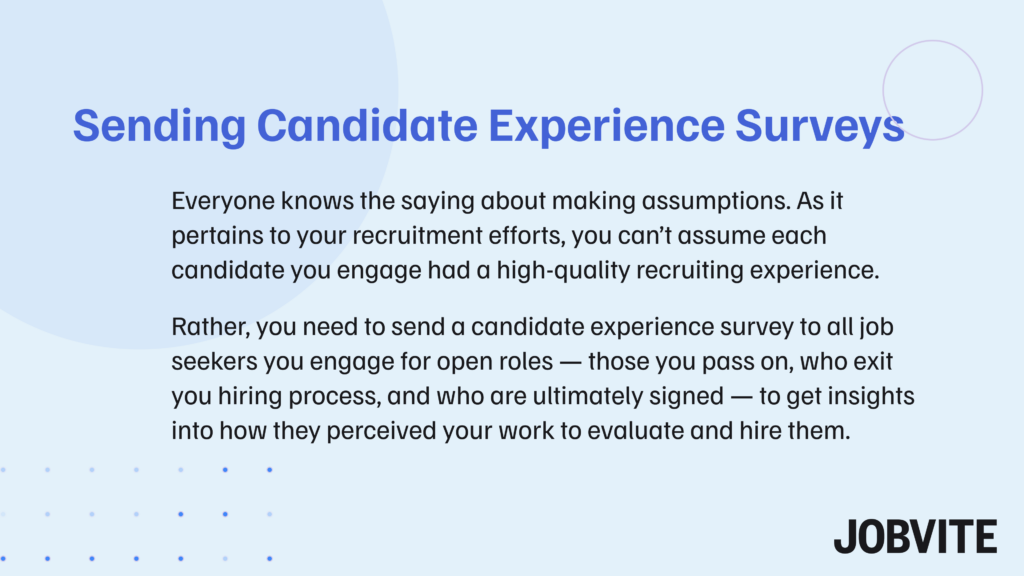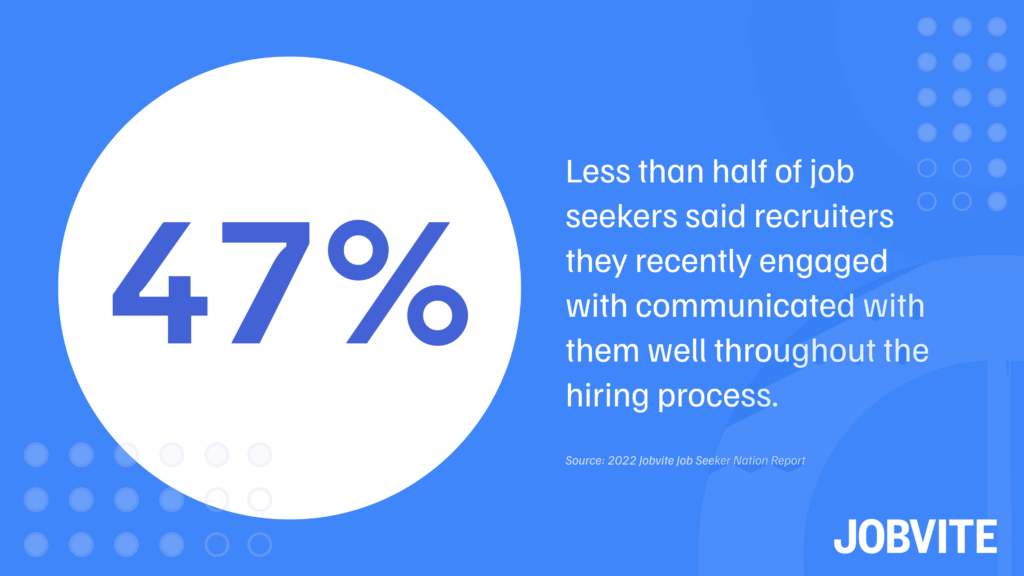Customize candidate experience survey template. Add questions tailored to your talent acquisition approach and interview process. Share results with recruiters and hiring managers.
That’s the simplified, three-step process to securing valuable insights into the candidate journey and making data-driven changes to your recruitment model, employer brand, and interview style.
It’s this kind of high response rates in terms of candidate feedback that can really help your TA team make intelligent alterations that lead to a a stronger recruitment experience for job seekers.
9 tips for sending candidate experience surveys
While your counterparts in HR send quarterly eNPS surveys to gradually enhance the employee experience, your talent team must send candidate experience surveys to each prospect you engage — passed-on prospects and those hired fill open positions — to improve your hiring efforts.
Here are some expert insights that can help you send well-crafted CX surveys and properly leverage the feedback from them to make data-backed modifications to your recruitment strategy.

1) Get feedback on your org’s hiring process
This candidate experience survey question provides insight into the prospects’ expectations throughout the process. Moreover, it can also help you understand their overall experience.
Learn how your org can continue to enhance the candidate experience and implement these changes accordingly. Listening to leads’ feedback will encourage them to potentially apply again soon.
Benjamin Farber, Bristol Associates, Inc.
2) See if your job descriptions match reality
Some orgs are too eager to attract candidates. This leads to misleading job descriptions. The result of this is unsuitable candidates applying for roles that don’t match their experience or qualifications.
A job description should read as close as possible to the role you’re looking to fill. A misleading description wastes time for both the employer and candidate and comes with a financial cost. If your candidate experience survey implies a mismatch, action should be taken to correct the issue.
Morgan Taylor, Sourcery
3) Get insights into recruiter responsiveness
“How responsive were our team members when you reached out to them?” One study showed that 50% of candidates said they turned down a job because of a poor recruitment experience.
Evaluating communication between candidates and TA specialists is essential to improvement. The great thing about this Q is it’s likely to provide a concrete answer with plenty of context.
Soumya Mohan, Poised

4) Check the potential for repeat application
It matters who the candidate partners with in the recruiting process. So, we don’t take that decision lightly. We work with candidates to put our best foot forward — especially since their success is our success.
The entire hiring process can be daunting — especially for someone who is new to it or has been in the process for some time without any luck. For them, the recruitment cycle can make the world of a difference. So, see if candidates had a good enough experience to come back and apply again.
Ryan Nouis, TruPath
5) Allow all candidates to leave comments
Give candidates space to voice their concerns, observations, and complaints. Only then will you be able to adapt your methodology and attract more candidates.
By including a simple text box at the end of the survey, you’ll ensure that no stone is left unturned in giving the candidate a platform with which to speak.
That way, you can make full use of their feedback and discover exactly what your candidates want to see. It’s as easy as asking, “Do you have any other comments?”.
Max Wesman, GoodHire
6) Gauge candidates’ willingness to refer
One of the most important items to include in a candidate experience survey is to ask the candidate how likely they are to recommend your company to other candidates or to other people in general.
Leads who have had a negative experience with your recruiting process are unlikely to recommend your brand. Of course, deeper insight into why or at what point the candidate developed a negative opinion of the org but asking if they would recommend your brand gives you a general overview.
Sharon Terera, Afrolovely

7) Learn how prospects heard about roles
Simply ask from which channel candidates heard about a position. This question will give you insight into how your brand is perceived and whether or not that perception is positive or negative. If a candidate mentions multiple channels, then you’re hearing a variety of opinions about your company.
To explore more, ask “What made you most interested in applying for this position?” This can help you determine how you position your brand in the candidate’s mind and better communicate it to them.
Adina David, Paperjobz
8) Include the option for a recruiter rating
One item you can include on a candidate survey is a “Rockstar Rating”. This question measures how well your recruiters are providing great candidate experiences.
Here’s an example of this in action: “On a scale of one to five, with five being the most satisfied, which of the following would best describe your recruiter and/or experience overall?”
On top of evaluating candidate experience, this question can also boost morale. Recruiters who often achieve high ratings will take pride in being “the best recruiter their candidates have worked with.”
Preston Sharpston, Parallel
9) Find out if candidates felt comfortable
One item to include in your candidate experience survey is a question on whether the candidate felt like they were able to ask questions during the process. It’s important for candidates to feel like they can ask questions about your company, its culture, and the role you’re hiring for.
This can help them decide if it’s a good fit for them, which is vital for both their happiness and yours.
Anup Kayastha, HeightComparison
Improving the candidate experience requires the right recruiting technology. Take the tour of our Evolve Talent Acquisition Suite today to learn how it can amplify your TA efforts.





